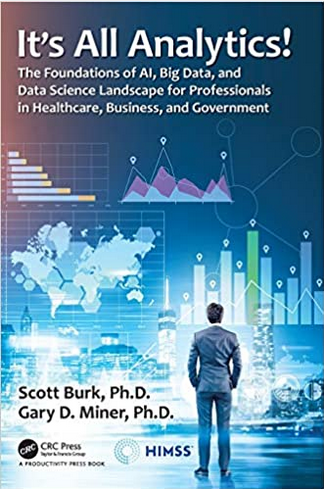

Founder, It’s All Analytics (itsallanalytics.com)
Scott Burk is an author of four books on AI, data science and analytics including the It’s All Analytics Series, the Executive Guide for AI and Analytics and Practical Data Analytics for Innovation in Medicine. He currently teaches in the Master of Data Science program at CUNY and has taught at Baylor and Texas A&M. He has worked for startups in multiple industries as well as established firms like Texas Instruments, Dell, Paypal, EBay, Overstock.com and in healthcare. Scott has a bachelors in biology and chemistry, master degrees in finance, statistics and data mining and a PhD in statistics. Scott has a data science consulting practice and resides in Central Texas
His experience is primarily in application; solving difficult analytical problems. He has diverse experience that includes a variety of executive (VP and Director) level positions in finance, IT, statistics, engineering, sales and marketing as well as front line, technical positions. Data has been the thread that has tied his professional experience together.
Available For:
Travels From: Austin, Texas
Speaking Topics: AI, Data Infrastructure for Data Science, Analytics
| Scott Burk | Points |
|---|---|
| Academic | 0 |
| Author | 71 |
| Influencer | 58 |
| Speaker | 0 |
| Entrepreneur | 0 |
| Total | 129 |
Points based upon Thinkers360 patent-pending algorithm.
 Causal inference is especially important in AI prescribed medical treatments
Causal inference is especially important in AI prescribed medical treatments
Tags: Analytics, AI, Leadership
 Turning predictive models into prescriptive ones is a meticulous process
Turning predictive models into prescriptive ones is a meticulous process
Tags: Analytics, AI, Leadership
 The future of AI is bright if humans and machines work hand-in-hand
The future of AI is bright if humans and machines work hand-in-hand
Tags: Analytics, AI, Leadership
 Causation in AI applications in medicine, predictions, and prescriptions
Causation in AI applications in medicine, predictions, and prescriptions
Tags: Analytics, AI, Leadership
 Causation: The most misunderstood concept in AI
Causation: The most misunderstood concept in AI
Tags: Analytics, AI, Leadership
 Models, Models, Models
Models, Models, Models
Tags: Analytics, AI, Leadership
 Some Fundamentals – Process, Data and Models
Some Fundamentals – Process, Data and Models
Tags: Analytics, AI, Leadership
 The Goal – 7 Keys to Enable Everyone for AI with a Platform
The Goal – 7 Keys to Enable Everyone for AI with a Platform
Tags: Analytics, AI, Predictive Analytics
 It's All Analytics! The Foundations of AI, Big Data and Data Science Landscape for Professionals in Healthcare, Business, and Government (978-0-367-35968-3, 325690)
It's All Analytics! The Foundations of AI, Big Data and Data Science Landscape for Professionals in Healthcare, Business, and Government (978-0-367-35968-3, 325690)
Tags: AI, Analytics, Predictive Analytics

Tags: Analytics, AI, Leadership

Tags: Analytics, AI